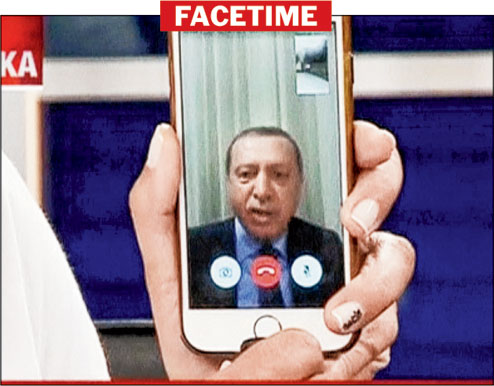

July 16 (Reuters): A 20th-century coup, defeated by 21st-century technology and people power and stained by the blood of hundreds.
Turkish forces loyal to President Tayyip Erdogan largely crushed an attempted military coup today after crowds answered his call to take to the streets in support of the government and dozens of rebels abandoned their tanks.
At least 265 people were killed, including many civilians, after a faction of the armed forces tried to seize power using tanks and attack helicopters.
When a self-styled military "Peace Council" tried to topple Erdogan and his increasingly authoritarian government on Friday night, the rebel generals and colonels seemed to be fighting the last war.
"This coup was obviously planned quite well but using a playbook from the 1970s," said Gareth Jenkins, a researcher based in Istanbul.
It was more like Chile in 1973 or Ankara in 1980 than a modern western state in 2016.
The rebels struck on a weekend when the President was out of town at a holiday resort. They seized the main airport, sealed off a bridge over the Bosphorus in Istanbul, sent tanks to Parliament, Ankara and the main road junctions, and broadcast a statement on TRT state television declaring a curfew and warning people to stay home.
But they failed to capture any of the ruling AK Party leaders or to shut down private television, mobile phone signals or social media networks, enabling Erdogan and his aides swiftly to call supporters into the streets to resist the coup.
On a night that sometimes verged on the bizarre, Erdogan frequently took to social media, even though he is an avowed enemy of the technology when his opponents use it and frequently targets Twitter and Facebook.
Erdogan, often accused of muzzling the press and broadcasters, used modern communications technology nimbly to get his message out to the population of nearly 80 million, outflanking the plotters.
He used the FaceTime video application on a reporter's smartphone to broadcast a message live on CNN Turk, a private TV station that the plotters tried but failed to silence.
"Let's gather as a nation in the squares," he said. "I am calling on our people now to come to the arenas and we will give them the necessary answer."
Within 20 minutes of the coup broadcast, Prime Minister Binali Yildirim went on Twitter to denounce the putsch and assure Turks that the armed forces' high command was not backing the revolt.
They were following in a long line of revolutionaries who used new communications techniques to outwit their enemies - from Protestant priest Martin Luther using the printing press in 1517 to spread his theses denouncing the Roman Catholic church to Ayatollah Ruhollah Khomeini recording audio cassettes in France that were copied and spread around Iran to defeat the Shah in 1979.
Social media have made it harder to suppress news and voices of protest. In Turkey on Friday, aides to Erdogan were able to get messages out to Turkish and international media that the President was safe and not under arrest even as soldiers were taking over the TRT television station.
The contrast was striking with the ultimately unsuccessful 1991 coup by hardliners against Soviet President Mikhail Gorbachev, who was reduced to listening to BBC World Service radio at his Crimean holiday home, powerless to intervene as events unfolded in Moscow.
The Soviet plotters managed to take control for three days before Boris Yeltsin rallied public opposition to the coup, standing atop a tank in Moscow.
As in the failed Soviet coup, the Turkish coup leaders were dependent on raw conscripts who had either not been told the truth about their mission, or had not expected to face popular resistance and quickly melted away or surrendered.
The rebels bungled an attempt to silence CNN Turk. A helicopter carrying conscripts with a single officer landed at the station but was told it was impossible to take the signal off the air.
They forced the temporary evacuation of the studio. When CNN Turk came back on air, anchorwoman Nevsin Mengu and general manager Erdogan Aktas described the mood of the young soldiers.
"These young soldiers had only fear in their eyes and no sign of devotion or determination," Mengu said. "They asked us to go offline but we said it was not doable. They didn't know how to do it so our empty studio was live on TV for the whole time before we regained control."
Religious leaders loyal to the President for the first time used the network of mosques with loudspeakers to urge Turks to go out into the streets in the name of a holy war.










